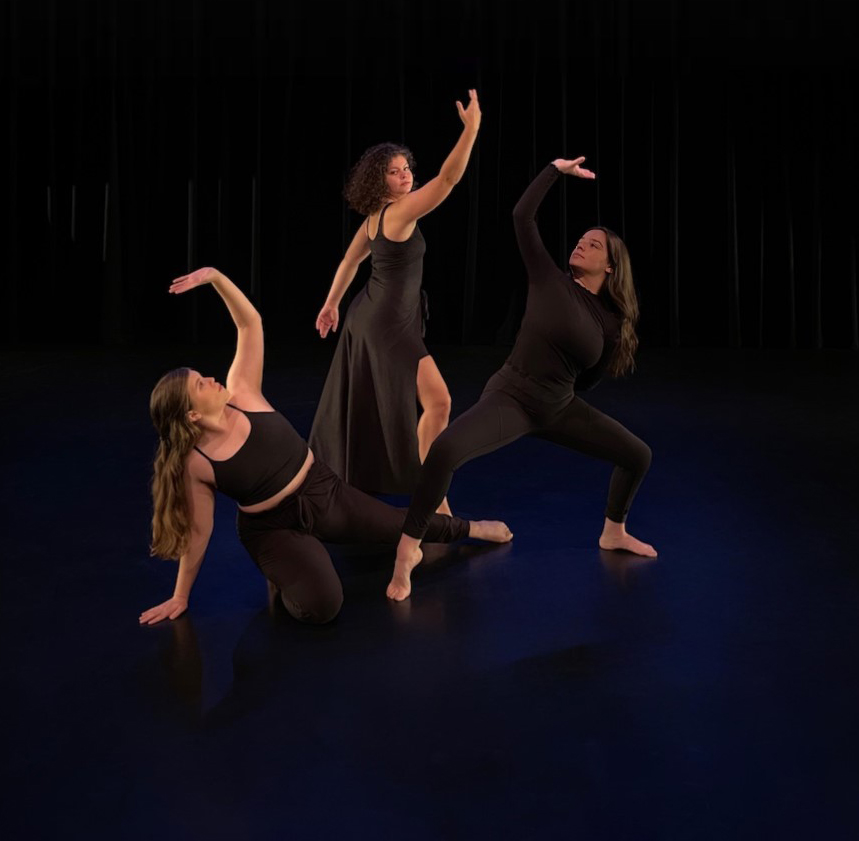Dance science students present capstone projects in two performances
What the audience will see in two upcoming dance performances will only scratch the surface of the work that students in the College of Performance, Visualization & Fine Arts put into them.
Beyond the choreography and the physical performance, six students in the Composition III course co-produced and took on all other related duties, including lighting, training a crew, selecting music and designing and making the costumes. It’s the final capstone project for the advanced-level choreography students.
“They are making these works from scratch,” said Jennifer Petuch, instructional assistant professor of dance. “A completely student-produced concert, which is a lot for undergrads.”
Terra Fiedler, Eliza Milner and Maddie Calvez present “The Edge of Movement” Dec. 4 at 2 p.m., and Grace Haus, Marielle Schneider and Brenna Street present “In the Midst” at 6 p.m. Both performances are in Room 207 in the Physical Education Activity Program Building. Admission is $5.
The students learn about matters beyond the stage in production classes, according to Ben Howard, instructional assistant professor, including set design and creating marketing materials for the shows.
When a student has struggled with a task, another has stepped up to help, the students said. Street, for example, said she hates sewing. But Haus enjoys it, calling it her strong suit.
“We complement each other well and have been able to help each other,” Street said. “That makes it feel less like a one-man band. There’s been a lot of good collaboration.”
The all-encompassing approach has long-term benefits for the students, Petuch said. Many go on to become high school dance teachers and need that wide array of experience.
“They are able to know how to do lighting plots, how to operate a light board, how to operate a sound board, how to produce costumes, work with costume people, and then of course choreograph and work with a group and direct,” she said. “They know the roles of everyone in a theater.”
Petuch serves as a mentor throughout the process “in case something goes haywire,” she said. A recent technical rehearsal revealed adjustments the students had to make, which is all part of the process, she said.
“It is a place to be able to make mistakes, to be able to grow and learn because it’s a safe environment,” she said. “You pioneer, you investigate, you figure things out and you live and you learn. They definitely did things that didn’t work and things that worked. It’s better to do that in a place where your job’s not at stake, to make mistakes now.”

The performances in the two shows range from serious to playful, and some are daring in their risk-taking, Petuch said; Milner, for example, built on her tap background to create a piece without music.
“It’s more like a sound score,” Milner said. “They’re creating the sounds and rhythm with their body and with their mouths. They’re clapping, they’re slapping their legs or snaps. It’s just being able to create movement based on the sound.”
Street’s piece “Entropy” is backed by a quartet of horns, she said, creating an “old jazz-esque feel.”
“I really wanted to have the audience feel this whimsy, a different world,” she said. “It doesn’t mean anything; it’s just fun, and it’s different than anything else I’ve choreographed.”
One of Fiedler’s works titled “Habit” involves oversized gray T-shirts, which the dancers use as an extension of their bodies.
“The title says it all,” she said. “It’s a habit. They’re trying to get away from it, but it pulls them back in and the shirt emulates that. And there’s a lot of different human elements that I think everyone can relate to. But the music and the way they go about it, it’s kind of ironic because it brings a whimsical, lighthearted aspect.”
Calvez said she found inspiration in her favorite hobbies for her piece “And Then There Was One”: Agatha Christie’s detective novels and the murder-mystery board game Clue.
“At the beginning of my piece you pick up on who [the killer] is, but that’s because I want the audience to get involved,” she said. “It was really fun taking something that I love playing and reading and putting that into a dance.”
A piece by Haus involves three women experiencing the loss of loved ones. She said she created the piece after the death of a close friend, when she went into the studio and sat on a stool and started “moving in a way that felt good.” The dance evolved into the women going through hardship and finding support in each other, she said.
“It was so healing for me to create,” Haus said. “Watching my dancers perform it and bring that emotion and bring their characters to life has been so incredible to watch.”
Schneider’s piece titled “Ode to Each Other” includes a song her boyfriend produced that reminded him of her mannerisms and moods, she said. She then created dance solos based on his mannerisms and moods.
“Then we put them together, so hence ‘Ode to Each Other,’” she said. “Him to me and me to him.”
The amount of work involved for the students means it will be “an amazing relief off them” when it’s over, Petuch said, and the technical rehearsal included “a proud mama moment.”
“It was really neat to watch it from the bare bones. The basics of pieces that were very rough in the beginning of the semester to pulling it together and seeing the final product,” she said. “Lighting, costumes, students committed to their pieces. That was really rewarding. This group — and, in general, the student body — they’re very open to learning and applying. That’s what I love about this group, they are very deep thinkers. They like the challenge to think conceptually. They like to keep challenging themselves. It was wonderful to watch.”